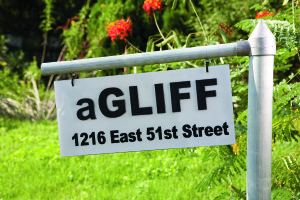It was 1987. With Ronald Regan at the helm of the country, conservatism and close-mindedness were widespread. National Coming Out Day had yet to be founded, and the GLBT populace was still widely shunned by society. In Austin – that bastion of liberal thinking and inclusiveness – life wasn’t much rosier for gays and lesbians. The University of Texas student senate had, a year prior, refused to fund a gay- awareness event. The largest gay and lesbian rights demonstration in Texas’ history, in which more than 20,000 people marched on the state capitol, was still nearly two years away, and reports of inequity were abundant.
But change was eminent. And with the birth of one particular organization that year, Austin’s gay scene would never be the same.
Founded by Scott Dinger, the Austin Gay & Lesbian International Film Festival began as a meager, four-day event that included only a handful of films, most of which were pri- marily driven by coming-out and AIDS-related content.

aGLIFF Headquarters
In fact, aGLIFF has expanded its mission, combining entertainment with community outreach and education. The group offers year-round programming, is involved with many community projects, and this year launched several new programs, including its “20 for 20” monthly gathering in commemoration of its 20th year anniversary.
aGLIFF has been through many incarnations in its time, and now the organization is emerging as the Austin film industry’s shining star, thanks, in part, to many newcomers working behind the scenes.
Board Vice President Calvin Williams has long attended the festival, but like many on aGLIFF’s nine-person board, Williams has been a part of the board for only two festival years. But instead of working as a disadvantage for the organization, Williams says a little new perspective can make a world of difference.
“I think this year’s festival was definitely a success, and we got a general feeling from the attendees about how great it was,” Williams says. “So the pressure is on for next year, and the planning has already started. We’re focused on how we’re going to get better and learn from the past couple of festivals. We’d like to take the lessons we learned and improve upon them.”
In addition to a relatively new board, aGLIFF’s only two staff members – Executive Director Lucas Schaefer and Programming Director Lisa Kaselak – are brand new to the organization, having been hired just months before the 2007 festival.
The two wasted no time in making changes, however, putting in long hours to make the festival the best it could be. And the public took notice. Seats at the Regal Arbor Theater, the festival’s venue, consistently were filled for the event’s more than 120 films. And aGLIFF even beat out other popular local film festivals – including South By Southwest and the Austin Film Festival – for a critics’ pick award in the Austin Chronicle’s Best of Austin issue.
But Schaefer says there’s still much work to be done.“I want as diverse an audience for the festival as possible,” he says. “We’ve had diverse crowds in the past, especially recently, but I would like to increase that. A lot of the films we show appeal to many different audiences. I’d like to expand on that idea. I would really like to take the festival to the next level.”
Williams says by including films that explore all types of issues as they relate to gay and straight lifestyles, the festival itself becomes more diverse, which, in turn, attracts a more diverse group of attendees.
“Gay issues in film are now more out in the open, more a part of mainstream life,” Williams says. “As that continues, I think aGLIFF will become even more of a community event that will appeal to all types of people. That’s how we’ll continue to grow.”




































